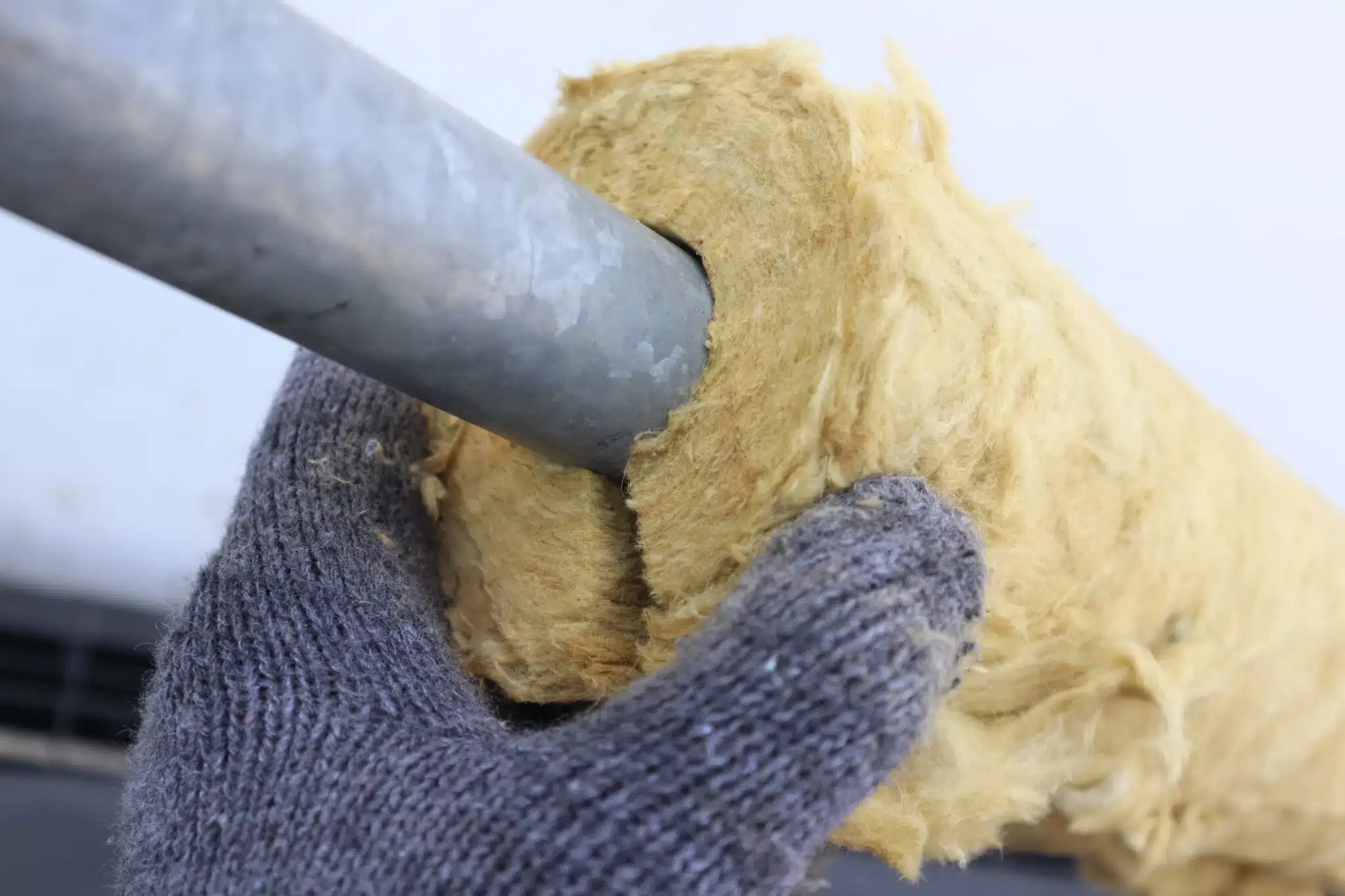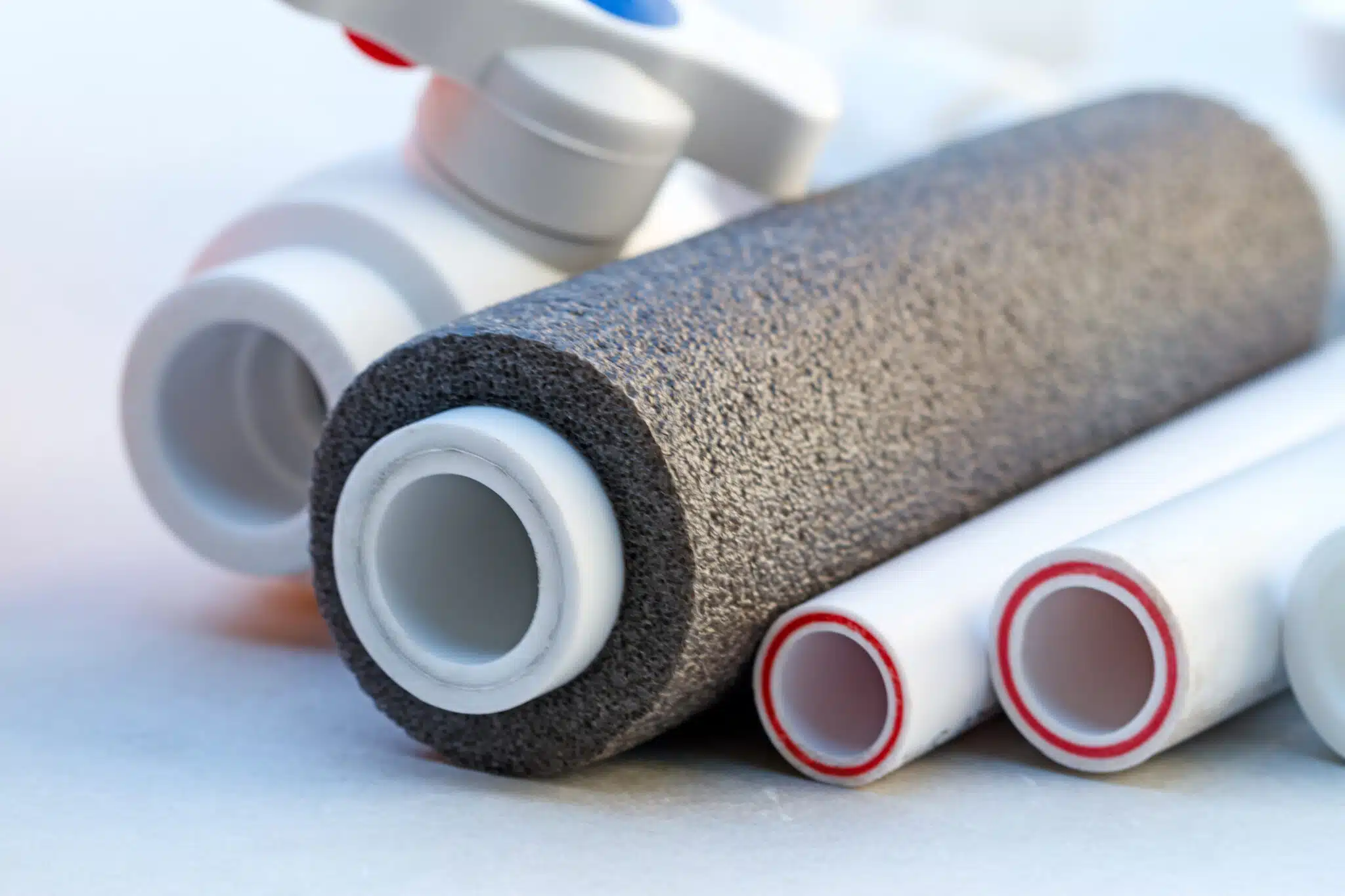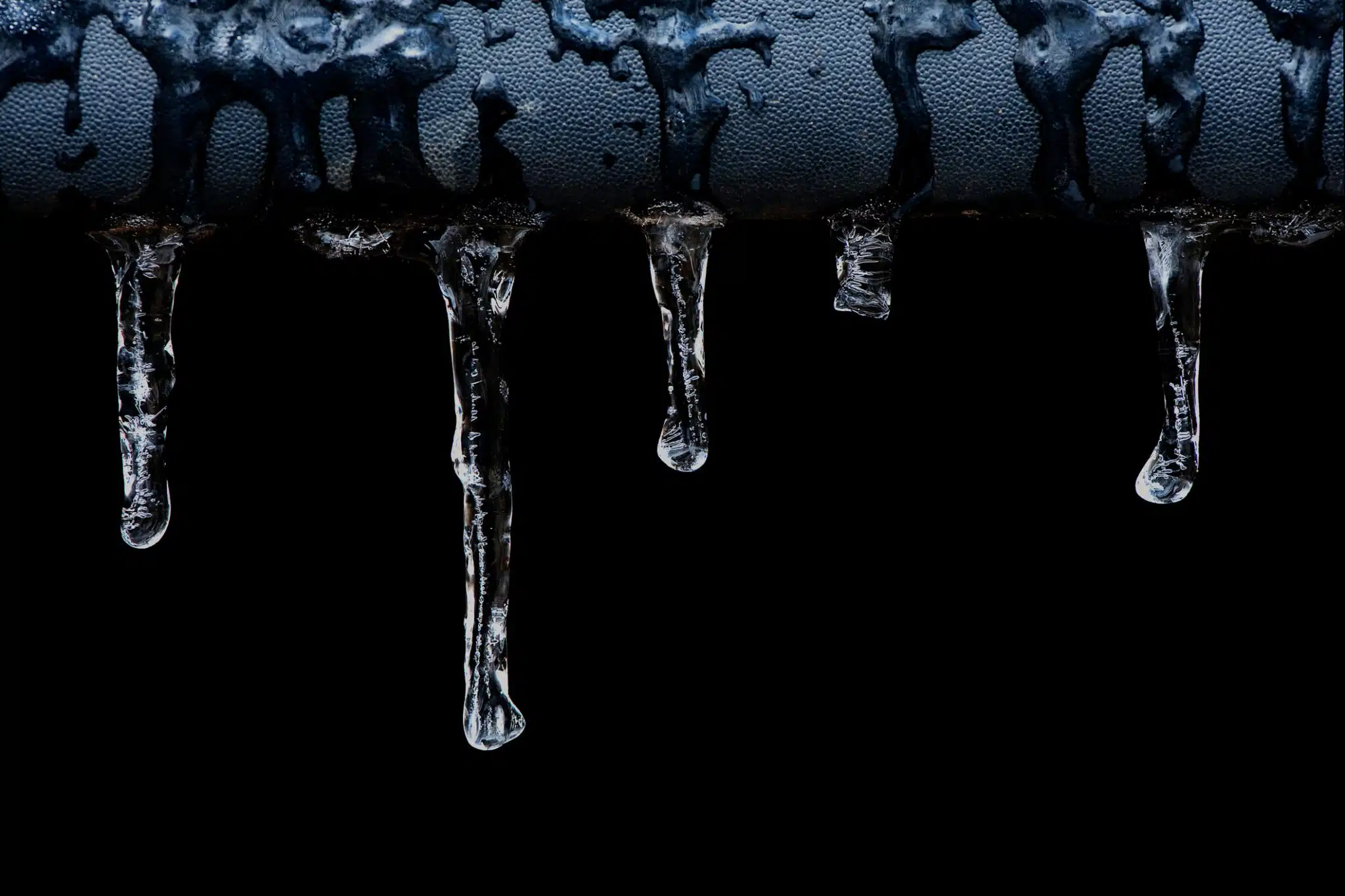Frozen pipes can seriously damage your home. To stop this from happening, wrap your pipes in insulation, keep your indoor temperature steady, and take care of things outside too. If you notice early signs of freezing, act fast to avoid expensive repairs.
Why Frozen Pipes Are a Big Problem
Ever wondered why frozen pipes are such a big deal in Lancaster, PA during winter? When water in your pipes freezes, it expands and puts a lot of pressure on the pipe walls. This can make the pipes crack or burst, leading to bad water damage and costly repairs. Some water pipes are outside or in unheated areas like basements and garages, so they can easily freeze when the temperature drops.
Most folks don’t know that while pipe insulation can slow down freezing, it can’t stop standing water in frozen pipes from freezing. But using flexible plastic foam insulation, like polyethylene, helps by cutting down heat loss and lowering the risk of freezing. Ignoring your pipes in the winter can lead to big problems. Broken pipes can cause flooding, mold, and even damage your home’s structure. Besides the high cost, the hassle and stress are things no homeowner in Lancaster, PA wants.
That’s why it’s key to know the risks of frozen pipes and take steps to protect your home.
Signs Your Pipes Might Be Freezing
Wondering if your pipes might freeze? Early detection can save you big trouble later. Here’s what to watch for with frozen pipes:
Reduced Water Flow
If water starts to trickle, your pipes might be freezing. This is a clear early sign something’s wrong with your frozen pipes.
Frost on Pipes
See frost on exposed pipes? The water inside might be freezing. Don’t ignore this clear warning of frozen pipes.
Strange Smells
Bad smells from drains can mean ice is causing a blockage. This odor often means trapped air can’t get out.
Bulging Pipes
A swollen pipe might be about to burst due to frozen water inside. This bulge is a big red flag needing quick attention.
Unusual Noises
Gurgling, banging, or clanking sounds can mean trouble. This noise often comes before a bigger issue and shouldn’t be ignored.
Cold Spots
Cold spots on walls or floors can signal freezing pipes inside. These cold areas act as silent alarms, warning you of danger. Spotting these signs early can help you take quick action and avoid costly damage in Lancaster, PA.
If you notice any of these, act fast!

How to Protect Your Pipes from Freezing
Want to keep your plumbing safe this winter? Frozen pipes can cause big problems, but some simple steps can help prevent this.
Insulation is key.
Wrap your pipes with foam to slow down freezing and provide a shield against the cold. Foam insulation is easy to install and cushions your pipes. Next, keep your indoor temperature stable. Don’t let your home’s thermostat drop below 55°F, even at night. Though it might be tempting to save on heating, the cost of fixing frozen pipes is much higher. A constant temperature keeps water flowing and stops freezing.
Also, keep cabinet doors open where pipes are near outside walls. This lets warm air get to the pipes and can help stop freezing. During very cold spells, let a trickle of water run from the faucet. Moving water is less likely to freeze.
Finally, think about using pipe heating cables. These are great for pipes that freeze easily. Residents of Lancaster, PA can particularly benefit from these practices, given the region’s cold winters.
By following these tips, you can enjoy a warm, worry-free winter and keep your home safe from the trouble caused by frozen pipes.
How to Prevent Frozen Pipes
Wondering how to keep pipes from freezing in Lancaster, PA? As temperatures drop, it’s crucial to protect your plumbing. Winter-proofing your home can be simple. Start by wrapping exposed pipes to prevent Frozen Pipes.
Use polyethylene because it’s flexible and works well. Frost can ruin neglected pipes, so focus on areas like basements, attics, and garages. Keep your indoor temperature steady. Even if you’re away, set your thermostat to at least 55°F. This small step makes a big difference in preventing Frozen Pipes.
Don’t forget outside precautions.
Disconnect garden hoses and drain outdoor faucets to avoid ice problems. Seal gaps and cracks around windows, doors, and your home’s foundation. A bit of caulk and weather stripping can help protect your pipes from the cold. When in doubt, let your faucets drip.
A small trickle of water can stop pipes from freezing by keeping water moving. For professional help with Frozen Pipes, trust Benjamin Franklin Plumbing of Lancaster, PA. They offer top-notch preventive plumbing services just for you.
How to Thaw Frozen Pipes Safely
Worried your pipes might be frozen? Here’s a simple guide to thawing frozen pipes before they burst. First, find the frozen spot. Check under sinks, in unheated basements, or where pipes are exposed to outside air.
Once you’ve found the problem area, try these steps:
- Open the Faucet: Open the faucet nearest the problem area a bit. This helps relieve pressure and lets water escape once it thaws.
- Apply Heat: Use a hairdryer or heat lamp to warm the frozen pipes slowly. Never use an open flame! For pipes behind walls, try an infrared lamp.
- Wrap and Warm: If you have heating tape, wrap the pipe and plug in the tape. Another option is to wrap the pipe with towels soaked in hot water, reheating them as needed.
- Space Heaters: In cold areas like basements, put a space heater nearby to speed up thawing.
- Keep an Eye on It: Check the pipes regularly. Once the water starts flowing, let it run for a few minutes to ensure complete thawing.
Remember, if you’re unsure or the freeze is extensive, call a professional like Benjamin Franklin Plumbing of Lancaster, PA. They have the know-how to handle tough situations safely.
Best Practices for Using Space Heaters
Space heaters are great for keeping specific areas warm, but you have to use them safely to avoid accidents. Have you thought about the risks of using space heaters to keep pipes from freezing? Frozen pipes are a common issue during the winter months. Here are some tips to use them safely.
First, always put space heaters on a flat, stable surface to prevent tipping over. You don’t want an accident that could cause a fire. Keep the area around the heater clear of flammable stuff like curtains or paper. It’s important to pick the right type of heater for what you need.
Look for models with safety features like tip-over and overheat protection. These features can shut off the heater if it falls or gets too hot, adding extra safety. When you place the heater, keep it at least three feet away from anything that can burn. This simple rule can help reduce fire risks.
Also, never leave a space heater unattended or running overnight. It’s best to turn it off when you leave the room or go to sleep.
Lastly, plug space heaters directly into the wall, not into extension cords or power strips, which can overheat and start a fire. Follow these tips to keep your home warm and safe during the cold Lancaster, PA winters and avoid issues with frozen pipes.
Common Places Where Frozen Pipes Occur in Lancaster, PA
Do you know where frozen pipes are likely to occur in your home? Finding these spots can stop burst pipes. Basements and attics are risky because they aren’t well-heated. In basements, pipes are often exposed to the cold. In attics, pipes feel the cold more due to height and open spaces.
Garage spaces are often missed. Pipes in the garage can freeze since garages are usually unheated. Adding foam insulation can protect the pipes, slowing down how fast water freezes.
Crawl spaces are also cold spots. They are below ground and, like basements, not well-covered from the cold. Insulate these areas and check their temperature to lower the risk of frozen pipes.
Kitchen and bathroom cabinets that hold frozen pipes can also be trouble spots. In extreme cold, even indoor pipes can freeze if they’re near drafts. Keep these cabinets open to let warm air flow around the pipes.
Prevention is key.
Spotting and protecting these areas in Lancaster, PA can save you from winter trouble.
Emergency Measures If Your Pipes Freeze
Did you wake up to no water or suspect Frozen Pipes? Don’t panic. Quick action can help a lot. Here’s a simple guide on what to do to limit damage.
First, open your faucets. The pressure build-up is what bursts pipes, so releasing it is key. Then, find the frozen section. Often, it’s in an unheated area like a basement or attic.
Next, apply gentle heat.
Use a hair dryer, heating pad, or small space heater. Never use an open flame. Move the heat source slowly along the pipe to thaw it bit by bit.
Keep the faucet open, as running water will help melt the ice. If the pipe stays frozen and you can’t find the blockage or it’s hard to reach, call a professional. Benjamin Franklin Plumbing of Lancaster, PA, offers fast emergency help for such problems.
Lastly, check for leaks once the pipe is thawed. A small crack can still cause big issues if ignored. Remember, prevention is better than cure. Think about insulating vulnerable pipes to stop future Frozen Pipes. Taking these steps can save your home from big water damage and the stress of costly repairs. Protect both your pipes and peace of mind by acting fast and calling in experts when needed.
Winter Safety Tips for Your Home
Is your home ready for winter? Besides keeping your plumbing intact and avoiding frozen pipes, there are other key winter safety tips to follow.
Ensure Your Heating System is Working Properly
Before winter starts, get a pro to check your heating system. Make sure your furnace or boiler is in good shape. This keeps your home warm and helps prevent frozen pipes.
Check and Insulate Water Pipes
Besides insulating your pipes to stop freezing, make sure they don’t leak and are well insulated with things like polyethylene. This type of insulation works well to keep out the cold and avoid frozen pipes.
Maintain a Consistent Indoor Temperature
Keep your thermostat at a steady temperature, day and night, to avoid cold spots. A steady temperature helps keep pipes from freezing.
Clear Gutters and Drains
Blocked gutters can cause water to pool and freeze, leading to damage. Clean your gutters often to ensure proper drainage and avoid ice buildup.
Use Space Heaters Safely
If you use space heaters, keep them away from flammable stuff. Never leave them unattended, and always follow the maker’s guidelines. Take these steps to ensure a snug and safe home this winter.
For any plumbing emergencies or to winterize your plumbing system, contact Benjamin Franklin Plumbing of Lancaster, PA — your go-to expert for reliable service.
How to Winterize Your Plumbing System
Want to avoid the hassle of frozen pipes this winter in Lancaster, PA? Winterizing your plumbing is key to preventing costly damage. Follow these steps to protect your pipes:
Drain Your Outdoor Taps
First, drain all outside faucets and hoses. Disconnect hoses from taps and let the water run out completely. This simple step helps prevent ice from forming and pipes from bursting.
Insulate Exposed Pipes
Next, insulate pipes in unheated areas like the garage, basement, or crawl spaces. Use foam insulation because it’s flexible and effective. While insulation can’t stop water from freezing, it delays freezing, reducing risk.
Keep a Consistent Indoor Temperature
Keep your thermostat at the same temperature day and night. A warm home reduces the chance of frozen pipes. Don’t set the thermostat lower than 55 degrees Fahrenheit, even if you’re away.
Seal Gaps and Cracks
Check your home for gaps or cracks, especially around windows, doors, and where pipes enter the house. Use caulk or foam to seal these openings and keep cold air out.
Monitor Your System
Check your plumbing regularly for signs of freeze-ups. If you think there’s a problem with frozen pipes, call Benjamin Franklin Plumbing of Lancaster, PA. They can help you stay worry-free during the cold months. Preventing a winter plumbing disaster takes a few proactive steps, but it’s worth it. Keep warm and prepare your home for the cold season!

Choosing the Right Insulating Material
Want to keep your pipes from freezing? Picking the right insulating material is crucial for preventing frozen pipes.
Types of Insulation for Pipes
There are different materials you can use to protect your pipes from frozen pipes, each with its own perks. Polyethylene foam is a flexible option to stop water lines from freezing and to cut heat loss in heating pipes. It’s easy to use and great for DIY projects.
Rubber insulation is also popular, offering toughness and some flexibility, making it easy to install.
Fiberglass insulation is strong and great for outdoor or underground pipes because it provides robust thermal protection.
Pros and Cons of Different Materials
Polyethylene foam is easy to apply and slows down the freezing process but doesn’t have as strong thermal resistance as other materials. Rubber insulation is flexible and durable. Its closed-cell structure resists moisture well.
Fiberglass insulation offers excellent thermal protection but can be harder to install and may need a vapor barrier to stop moisture buildup. Choosing the right insulation makes a big difference in keeping your pipes safe all winter, especially in places like Lancaster, PA.
Benefits of Regular Plumbing Maintenance
Ever wondered how routine plumbing maintenance can save you money and stress in the long run? Regular plumbing maintenance helps spot potential issues before they turn into costly disasters. For homeowners in Lancaster, PA, checks by Benjamin Franklin Plumbing of Lancaster, PA can find weak spots that might cause frozen pipes in winter. Ignoring your plumbing can lead to sudden breakdowns and big repair bills.
By scheduling regular maintenance, you ensure your pipes are insulated properly and your system works well. While polyethylene insulation helps delay freezing, only thorough checks can confirm there are no weak spots in unheated or outdoor areas. Plus, maintenance includes clearing blockages that could trap water in your pipes, lowering the risk of frozen pipes and bursting.
Regular upkeep also keeps your home’s plumbing in good shape and increases its value. Reliable service from professionals gives you peace of mind, so you can enjoy a safe and comfy home even in the coldest months. In the end, don’t underestimate the long-term savings and peace of mind that come from being proactive with your plumbing maintenance.
FAQs
-
Why is preventing frozen pipes so important?
Preventing frozen pipes is key to avoiding water damage, expensive repairs, and the hassle of no water, especially during winter in Lancaster, PA. Taking action early can protect your home from a big problem.
-
How can I tell if my pipes are starting to freeze?
Signs that pipes are freezing include less water flow, frost on pipes, weird smells from drains, and changes in water temperature. Act fast if you see any of these signs to stop further damage.
-
What should I do if I think my pipes are frozen?
First, turn off the main water supply to prevent bursts. Then, use a hair dryer, heat lamp, or warm towels to thaw the frozen area slowly. Do not use open flames or direct heaters as these can cause fires. If unsure, contact Benjamin Franklin Plumbing of Lancaster, PA.
-
Can all pipes freeze, or only water pipes?
All pipes can freeze, not just water pipes, especially in unheated areas. Insulation slows down freezing but doesn’t stop it. Keeping a steady, moderate indoor temperature helps protect your pipes.
-
What insulation materials are best for pipe protection?
Polyethylene foam is flexible and effective to prevent freezing and cut heat loss. Other options are fiberglass and rubber insulation. The best material depends on your needs. Ask a professional plumber for the best advice for your situation.









